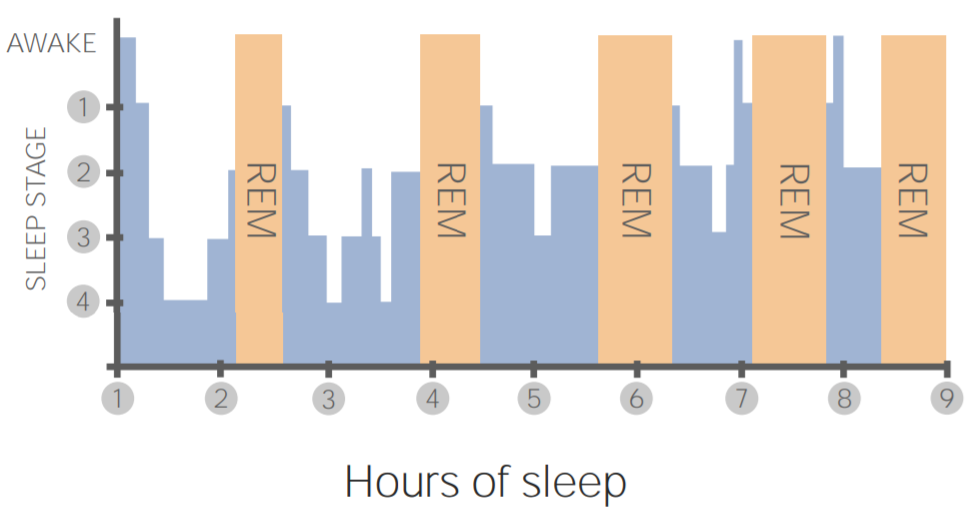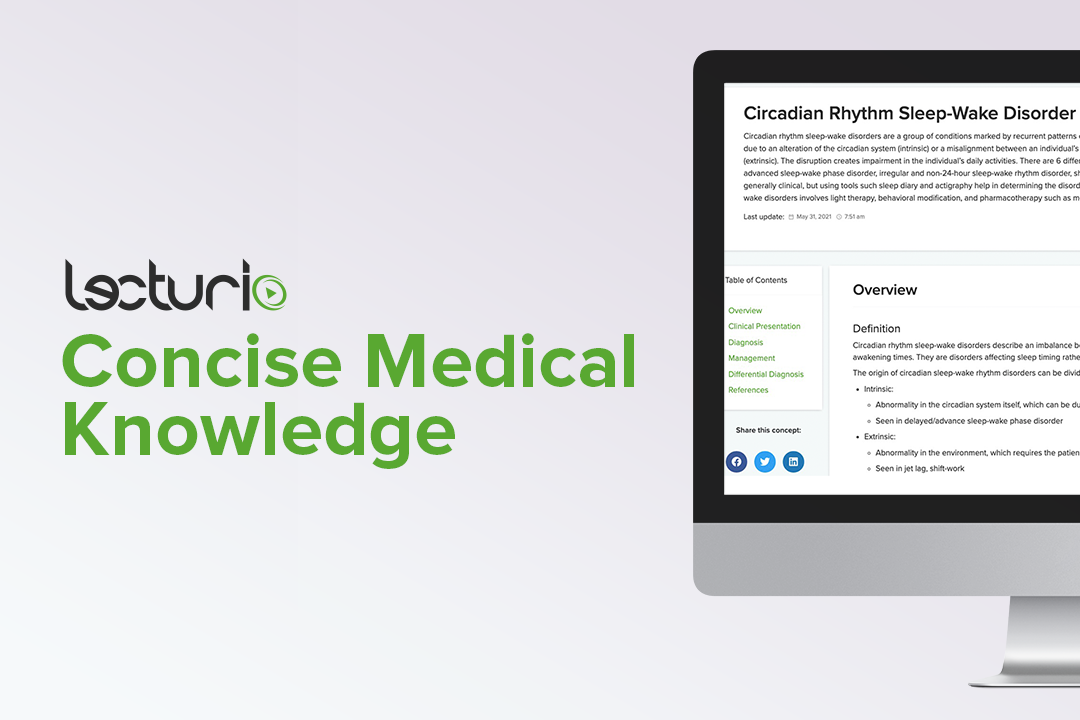Playlist
Show Playlist
Hide Playlist
Sleep, Circadian Rhythms and Dreaming – Consciousness (PSY, BIO)
-
Slides State of Consciousness.pdf
-
Download Lecture Overview
00:01 Okay. So, why do we sleep? So an obvious thing is we need to sleep in order to survive. 00:08 So that’s called the survival theory. 00:09 And that we’re diurnal by nature, meaning that we’re creatures of the day. 00:13 And that makes sense, right? A lot of animals are like this, is that they have better vision during the day, there are less predators during the day and so we function during the day and we go to bed at night. 00:24 So the restorative theory is that sleep allows the body to heal and repair tissue to include -- including the brain, allows it to reorganize, consolidate, and store the memories that we have. 00:35 Now, this theory is quite popular because, again, it makes a lot of sense because during the day you’re quite active. 00:40 You’re spending energy, you’re using your muscles, you have a lot of tissue damage. 00:44 At night time you need to shut down, let everything take care of itself, and all the interactions and engagement that you had during the day need to get consolidated and stored, which is another reason why a lot of times, your dream involved concepts of what’s happened to you that day. 00:59 Okay? So during the day, you got up, you went to school and you heard your professor. 01:04 You talked to that cute girl down by the coffee shop. 01:07 You went and had dinner with some friends, you watched a sporting event, and then you went to sleep. 01:11 It’s not a coincidence at night your dream involves, you know, the girl that you met, all of a sudden, you’re in a sporting event, you’re the star. 01:19 You know, and so on. 01:21 So concepts and pieces of what’s happened in your day start to show in that movie that’s playing in your mind, in your dreams, and the hypothesis is that the concepts and the memories of the day being consolidated and stored. 01:35 The glymphatic system plays a large role in the restorative function of sleep by helping to clear waste products from the brain. 01:43 It consists of perivascular tunnels, or “pseudolymphatics,” formed by astroglial cells. The system is more active during sleep, when the interstitial space expands. t also distributes essential compounds to the CNS and facilitates the movement of cerebrospinal fluid and interstitial fluid. 02:05 There’s also the growth theory, which is during sleep the pituitary gland releases a lot of the growth hormones and the levels of the hormone released decline as we age. 02:13 Hormone release also helps determine when we sleep. 02:16 So, that is influencing when we sleep, but why we sleep might be because of this distribution of some of these hormones. 02:23 And so as we get older, we tend to sleep less and we tend to have lower levels of these hormones, also, not a coincidence. 02:31 Okay. So dreaming occurs while in the REM stage of sleep. I’ve mentioned that already. 02:35 Now, there’s a phenomenon called REM rebound, which is when you don’t have periods of REM and your body finally gets REM, you have an increase in the period, duration, frequency, and content of that dream. 02:48 So, in English, what am I talking about? So a phenomenon is, certain medications that you take actually prevent you from getting into REM. 02:56 We know that alcohol, especially higher levels of alcohol, prevents you from achieving REM sleep. 03:02 So, take this example. 03:04 You’re going away on vacation and you’re at a resort, and it’s an all-inclusive and you’re eating and drinking and you’re enjoying yourself, and you’re by the pool all day drinking margaritas and you’re having drinks with dinner. 03:14 And you might have maybe more than you normally would on a regular basis. 03:19 In a week-long all-inclusive, you’ve had quite a bit to drink. 03:23 And you might not be actually achieving your normal sleep, you’re not getting all your REM, and so your body remembers that. 03:28 And it has a sleep debt. 03:30 It’s saying, “Well, you owe me some REM. I haven’t had REM in a week.” And you get back home. 03:35 And the first few nights you get back home, you sleep like unbelievably, because you’re back in your home bed, you’re not drinking anymore, you’re out of the sun, but you have this REM rebound. 03:43 You have these very dramatic dreams. 03:45 And the periods of REM will be a little bit longer, and you might have more episodes of REM that night. 03:50 And so, you know, in your normal dreams, they show you playing football, and in this REM rebound dream, you’re playing football and it’s a championship game. 03:58 It’s very loud, it’s very intense. 04:00 You know, a lot of times it’s almost frightful these dreams because they’re so intense, and that’s that rebound effect. 04:06 You’re also going to have something called lucid dreaming, is when the dreamer is aware that they’re dreaming. 04:09 This is a cool phenomenon. 04:10 And this is I’m sure happened to you before, where you’re in a dream, and in this dream, you know, I don’t know, you’re unusually strong and you’re surrounded by a bevy of beauties and you’re driving a Ferrari and you’re beating up the bad guy at same time and you’re a bullet proof and nothing is killing you and just things are phenomenal. 04:29 But in the dream, you’re kind of aware that this isn’t true. 04:33 And so, as the dreamer, you’re aware that this is definitely not true, but the dream can continue, and you’re aware of the fact that you’re dreaming. 04:42 And a lot of times, those who are well-versed in lucid dreaming can actually shift and shape where the dream is going to go. 04:48 And, again, you may have done this before where you’re like, “This is so good. I hope this doesn’t end. I want more of this,” and you almost urge the dream to go on, or you might almost get bumped out of your dream and you force your way back into the dream. 04:58 This is called lucid dreaming. 05:01 So, why do we dream? Freud had a theory. 05:05 So Freud says that the plotlines of dreams or manifest content were symbolic versions of underlying latent content, or unconscious drives and wishes. 05:14 Again, this might make sense. 05:16 If your dream was to always wanting to be a soccer star, and you have dreams all the time of you playing in the World Cup and scoring the winning goal and hoisting up that trophy, that might be some underlying unconscious drives and wishes for you. 05:33 You know, in your dreams you might be having sex with a model that you adore and you have her pictures up on your wall, and at night time you’re having these dreams. 05:42 I think that unconscious drive is quite clear. 05:46 There’s learning and problem solving. 05:48 Dreaming helps improve this ability. 05:50 Okay. So it’s really important that prior to, say, you writing your MCAT exams, you actually get as much sleep as you can. 05:58 And it’s unfortunate, because what do we end up doing in university or things like writing the MCAT? You pull all-nighters, you cram, and you limit the amount of sleep that you’re getting. 06:05 It actually lowers your ability in terms of how well you do on the test. 06:09 This has been shown experimentally with rats in a maze and that rats that aren’t allowed to sleep perform much more poorly as opposed to ones that are allowed to get ample sleep, and hit REM they do very well. 06:22 So, before your exam, make sure you’re getting tons and tons of sleep. 06:26 There’s also the activation-synthesis theory, which dreams are byproducts of brain activation during REM. 06:31 Again, what’s happening to you during the day? And what have you acquired? What sensory information has come in, you’ve perceived it, and now you’re trying to store it and consolidate it? So what’s going on is during the day, all that stuff needs to be compiled and the dreaming actually allows that. 06:46 And some of that is expressed during REM.
About the Lecture
The lecture Sleep, Circadian Rhythms and Dreaming – Consciousness (PSY, BIO) by Tarry Ahuja, PhD is from the course Making Sense of the Environment.
Included Quiz Questions
Which psychologist described the ideas of manifest and latent content in dream interpretation?
- Sigmund Freud
- Carl Jung
- Calvin Hall
- Wilhelm Stekel
- Robert McCarley
After a period of sleep deprivation, an individual returns to a normal sleep schedule. Which sleep stage will increase the most?
- REM stage
- NREM stage 1
- NREM stage 2
- NREM stage 3
- NREM stage 4
Ann had a dream in which she wrote an award-winning novel. Despite knowing it was a dream, she stayed in it until the alarm rang. What does this situation describe?
- Lucid dreaming
- Daydreaming
- Somnambulism
- Unconscious dreaming
- Activation synthesis
Customer reviews
5,0 of 5 stars
| 5 Stars |
|
5 |
| 4 Stars |
|
0 |
| 3 Stars |
|
0 |
| 2 Stars |
|
0 |
| 1 Star |
|
0 |





